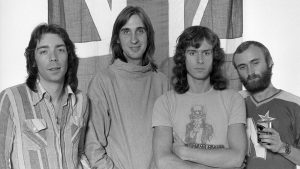In partnership with BandLab
It’s been quite the week for Reno Rojas. To celebrate the release of her debut album ‘Libre’, the Mexican songwriter treated herself to a three-day bonanza at Corona Capital – the crown jewel in the country’s festival calendar – that very same weekend, headlined by seminal acts such Blur and The Cure. “That’s why my voice sounds hoarse!” she jokes, speaking to NME via Zoom from the peace and quiet of a hotel.
Citing Brittany Howard, Olivia Dean and Parcels as some of her standout performers of the weekend, Rojas squeezed her own show into the weekend’s proceedings, at Foro Indie Rocks – an auditorium she tells us she’s dreamed of headlining since selling out its second room last year. “It was super exciting because it got sold out. I hadn’t even come up with the album or anything, I just had a few covers,” she says. “I feel super supported. This time, I got to meet [the fans] after. I feel super honoured.”
Despite clocking in at a brief seven songs, ‘Libre’ is a mission statement album for Rojas. Sung entirely in her native Spanish, the tracks combine the Boleros and Bossa Nova genres of her youth with a fresh indie-pop twist, making for a collection of soulful, comforting tracks, be it the cinematic ‘Alquimia’ or the playful ‘Cómplices.’ The closer and title track ‘Libre’ – which she submitted for the BandLab and NME present: Get Featured Opportunity – sums the album up perfectly for the healing process that it is.
“Even if I’m broken inside / I can glue myself back together” she sings on the track, having navigated uncomfortable, personal truths and come to terms with them through the course of the creative process. Rojas spoke to NME about her journey to date, as she is chosen as the latest selection of the BandLab and NME present: Get Featured Opportunity.
NME: Why did you choose ‘Libre’ for the BandLab and NME present: Get Featured competition?
“It was the first single from the album, and emotionally it was super liberating. At first, I didn’t think of it as that profound and I wasn’t doing an album with a concept, but it kind of started to develop, because all the songs that I wrote were about personal things. I’m talking about my grandmother, I’m talking about my father; things that are super personal that made me super vulnerable. But also, for me, making that song was profoundly healing.”
How did you unlock that level of vulnerability on the album?
“I think the only way that I found I can be vulnerable is [through] music. There are so many layers of my consciousness that I could not reach by just speaking with someone. I feel vulnerable when I’m playing the guitar or the piano in my room. I start taking all the layers off; the masks that I put on in my daily life.
“Because I saw my scars, it actually made me feel more free, and more in touch with my emotions. I’ve always been ‘the happy one’, I’m not that emotional. When I was writing these songs, I was looking at all of these wounds that had made scars. Look at the beauty of those scars now, because they’re not open anymore. They are closed, they heal, but there are scars, and they mark my life through the years.”
Credit: Roberto Philippe
Has music always served this purpose for you?
“It’s for understanding my emotions, but also with a duality. Since I was eight years old, I used to sing with my grandmother for fun in her garden. I had a big connection to Boleros – it’s a very classical genre of Mexico. I can just jam, play a cover or just learn a new song for the passion of it.”
“My first covers were all boleros, like ‘Contigo Aprendí’, ‘Bésame Mucho’, most of the classics. Then, through the pandemic, I started learning bossa [nova], through Gilberto. I already had the lyrics for my songs, but I couldn’t find the genre I wanted to be. I discovered João Gilberto, Caetano Veloso and Tim Maia – I was super inspired by Brazilian music. I started playing samba rhythms and bossa, and that’s how I came up with this mix of indie-pop, also with some bossa.”
Which other contemporary Mexican artists are you inspired by?
“There are so many projects that I’m enjoying so much. Silvana Estrada, Natalia Lafourcade with her new album. [Marian] Ruzzi, that was my producer. I love Vanessa Zamora as well. I never get tired of learning new types of music – I’m not married to a genre. I’m not the kind of character that only listens to the same album for ten years. I will search for more and more and more. I think that’s the reason why my album sounds so dyslexic!”
Credit: Roberto Philippe
How was your experience recording ‘Libre’ at Sonic Ranch in Texas?
“I wanted to record in a different place. Because for me, making an album is a journey, an adventure. I felt that in ‘Libre’, I’m looking at my scars, but, by looking at them, I started feeling free. So for me, we needed to find another studio outside Mexico and to tell a story with that.
“As an independent artist, you cannot stay for that long! I could have lived there for three months. We had 10 days, and it was intense. For ‘Retrovisor’, I recorded it with only my guitar and voice, in the night. I had time to connect with my emotions to be super vulnerable, and it was like a very cathartic experience.”
How’s the next album shaping up?
“I’m recording it in Havana, Cuba, in February! It was super important to make ‘Libre’ to look to the Reno of the past and honour that girl that was super brave to make this album. But all the time, I’m looking forward. I’m gonna do an album that has more concepts in there, in a fun, experimental way, I guess. But also, it’s gonna be an adventure.”
Reno Rojas has been chosen as the first selected act for BandLab and NME present: Get Featured, a new music initiative through Opportunities via ReverbNation. You can submit a track to be considered for the next round of Get Featured here.
The post Reno Rojas on the introspective journey that led to ‘Libre’ appeared first on NME.




